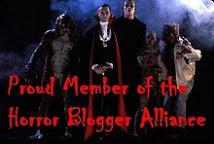This is a rather simple theory - I'm sure that if I watched footage of real people being murdered all day it would probably test my sanity, and filmmakers have done an increasingly good job of mimicking reality over the years - but I'm a rather simple man. Drawing that line in the sand allows me to push myself to view the strangest and most intense things on film, and as long as I remember that I'm in control of my side of the screen I am safe. That doesn't mean I'm putting up a wall to what the movie has to offer - I have to let some of what I see effect me if I really want to get the most out of it - it just means that I am aware enough to keep myself grounded while I experience the film.
It's funny to me that the first movie I think of when I discuss this belief is one that revolves around a device that opens the barrier between reality and depravity. But that film, Hellraiser, is a film that always makes me think about how important it is to maintain a distance between myself and whatever evils might be on the other side.
It would be easy to talk about the evil in Hellraiser by looking at the Cenobites, the group of disfigured demons who exist in the film's version of hell and make their way into reality by the film's conclusion, but that's a short sighted view of what Hellraiser has to offer. Evil is present in Hellraiser from the very beginning of the film, and Barker makes sure that we are at least slightly uncomfortable with everyone and everything in the film.
It's possible we feel that way about him because he's married to Julia, played by Clare Higgins, who is established immediately as a frigid creature who had a torrid affair with her husband's brother, Frank. Barker takes the time to show us how this affair began - to me it appears that Frank forces the issue and Julia develops an addiction to his dominance - which develops Frank as a hedonistic pleasure seeker and Julia as someone who will also give her self willingly to fulfill her needs. Julia also has Larry in her pocket, and there's a recurring theme of him offering to do things for her while she reciprocates nothing toward him. Barker perfectly sums this up when she seems repulsed by the religious icons their inherited home, and Larry instantly discards them with the trash - almost inviting evil into this home.
The most innocent character in the film is Larry's daughter Kirsty, played by Ashley Laurence, but she seems more like a lost puppy than a strong character in the film. She is the first to confront the evil forces in the film - both the resurrected Frank and the Cenobites - and nothing about her reaction to them makes her seem like someone who has the ability to stand against evil. Most horror films that provide an escape from reality are based around a force who can stand against evil, but the only thing Kirsty can do when she is faced with the Cenobites is to be an informant and offer her evil Uncle in exchange for her own life. When I look at Kirsty against other final girls of the era - Nancy Thompson from A Nightmare on Elm Street comes to mind - there's not a lot to like about her.
Most people scoff at a film where none of the characters seem to be a force for good, but to me this is a key part of Barker's attempt to make Hellraiser uncomfortable from start to finish. These characters are surrounded by grimy and gross images, with the camera focusing in on things like dirt-filled fingernails and bowls of rotten food and maggots, throughout the film. These images set the tone for the blood splatter that will follow, and when we do see hooks rip the flesh of the Lament Configuration's victims the camera is as close to the action as possible. I've seen Hellraiser more times than I'd like to admit, and I still find that it has more moments - both gory and just plain gross - that make me look away from the screen than almost any horror movie out there.
The short version of what I was saying just then is that Hellraiser is a story about people who don't recognize the figurative barrier between good and evil. And that leads to them crossing the literal barrier between their reality and a pure, evil reality. Whenever I watch Hellraiser, I realize that I am strong enough to know the difference between good and evil. Is it bad that it takes this much depravity to help me see that? Maybe, but that's a different story for a different day. At the end of this day Hellraiser strikes me as an inspiring work of art, because there's a beautiful feeling that I get after I sink deep into its world and come out safe on the other side. Pinhead might tell me it's "a waste of good suffering", but he's on the other side of that screen. He has no power over me.





















































